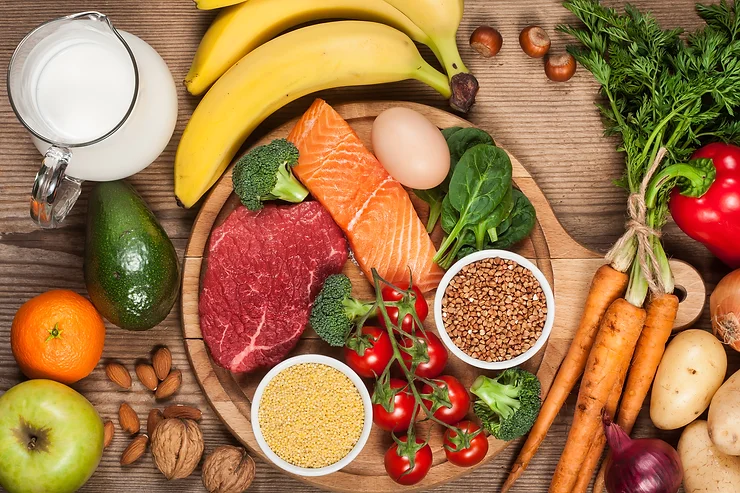Although no particular food causes ADHD and so far researchers have yet to discover the “miracle food” that can cure it, without a doubt, diet has a significant impact on the severity of ADHD symptoms. As the old saying goes, “You are what you eat,“ and the connection between the foods we eat and ADHD is especially strong. Therefore, being familiar with basic guidelines about which foods to include as well as others to avoid in the ADHD diet is extremely beneficial in overall ADHD treatment. In addition, if we add to the equation that many ADHD medications suppress appetite, it becomes even more crucial that the calories actually consumed will have the best impact on ADHD management. The ADHD food connection is an enormous topic, but here are the highlights.
For starters, eating adequate amounts of protein is especially significant part of an ADHD diet. Protein provides us with amino acids, the building blocks of neurotransmitters. Neurotransmitters are the chemicals produced by our brain that allow brain cells to communicate with each other. Consequently, insufficient protein consumption will directly affect the ability to pay attention, alertness, and emotional control. Proteins also stabilize blood sugar levels which lessens hyperactivity. There is also evidence that protein consumption with ADD medications aids their absorption. (Healthcentral.com, Eileen Bailey, 2010)
Yet despite the numerous benefits of including enough protein in an ADD diet, child psychologist Vincent Monastra, Ph.D. says less than 5% of children are eating recommended amounts of protein at breakfast and lunch. (additudemag.org, 2017)
Therefore, it is strongly suggested to eat protein rich foods especially at breakfast and lunch. The best high protein options are chicken, turkey, fish, eggs, beans, nuts, and low-fat dairy products
Next, fill up your water bottle. Staying properly hydrated is integral to good brain function. It makes sense since our brains are composed of 80% water. In fact, according to research, a drop in hydration by only 1% causes a 5% drop in cognitive abilities. (waterbenfitshealth.com, 2017)
Even mild dehydration affects focus, thinking, clarity, memory, and emotional regulation. Further, these statistics are for the neurotypical (non ADHD) population.
So, for someone with ADHD who may already experience some impairment in these areas, the consequences of not drinking enough water are even more dramatic. A general rule to follow with water intake is to drink (in ounces) half your body weight in pounds. For example, someone who weighs 100 pounds would drink approximately 50 ounces of water. The only exception to this rule would be for overweight individuals. So, drinking enough water is an easy and important daily habit that makes a big difference for ADD.
Another important dietary consideration is the impact of carbohydrates on ADD symptoms. While protein increases alertness, refined carbohydrates have the exact opposite result and cause sluggishness and lack of mental clarity. Unfortunately, people with ADHD often naturally crave the quick sugar high that sugary foods, white bread, and white pasta can provide. These foods appeal to the ADD brain because the immediate supply of glucose increases neurotransmitters like dopamine and serotonin which have a brief pleasurable and calming effect. However, the short term positive effect is outweighed by the longer lasting feeling of brain “fog” and fatigue.
In fact, even though “sugar has never been proven to affect children’s level of hyperactivity, some parents swear that removing sugar from their child’s diet reduces their symptoms of ADHD.” (Livestrong.com, 2017)
The solution, is to try to replace these foods with more whole grain foods, fruits, and vegetables. These foods provide a more steady supply of sugar to the bloodstream and consequently improve concentration and behavior.
Finally, the importance of healthy fats in an ADD diet should be discussed. This fact is quite logical since it is known that the human brain is the fattiest organ of the body consisting of 60% fat. (Mercola.com, 2009) While unhealthy fats like pizza and fast food burgers should be minimized, healthy fats especially Omega 3 and 6 which are contained in fish like salmon, trout, tuna and walnuts make a big difference for ADHD. If you are not a big fan of fish, Omega 3/6 supplements are an excellent substitute. Further, Omega 3 supplements are the only supplement proven to significantly improve ADHD symptoms in clinical research studies.
This new data further suggests that fatty acid supplements can be a good alternative or supplemental treatment, especially for those who have found stimulant medication ineffective. (Additudemag.com, 2017)
Overall, the influence of diet as part of a total ADD treatment plan cannot be overemphasized. Food carries tremendous power to either enhance ADHD brain performance or exacerbate ADHD symptoms. So, bottom line, what’s on your plate really does matter.

